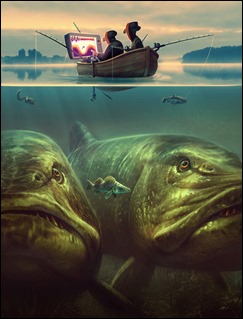This is a good take on something I’d thought about in other terms.
Many tech and media-savvy people live in a bubble. They believe implicitly that their experiences encompass the majority of humans, but in reality it’s a small minority.
Here’s an example.
The last IT department I worked in had about two dozen people in it. I use “IT department” because that is usually full of pretty tech-savvy people, and this one was no exception.
However even in this bastion of tech-savvy people, only a few of them had a Facebook account. I don’t think anyone had a Twitter account. Most of them — save one app addict — didn’t really use any apps on their phones that I ever saw (and I spent a lot of time with many of them).
Obviously many people use Facebook and Twitter, of course. But not in the ways and not in the contexts that I suspect many of the media elite use it, and are expecting others to use those platforms.
They are all looking for views and customers in a place that’s easy to determine if you’ve found them, meanwhile ignoring the 90% of your possible customer base — like me and all of my co-workers — who aren’t into that sort of brain hijacking.

